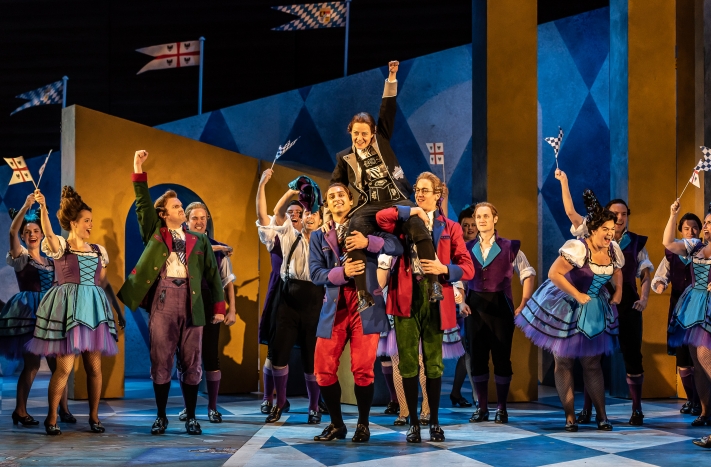The Turn of the Screw, Thurs 4th July 2019
This is a strange story, written in faded ink. Benjamin Britten’s adaptation of Henry James’ 1898 ghost story is a chamber opera in two acts, with a cast of six and just 13 musicians, a pared-down ensemble which produces an impressive richness of sound and atmosphere. Dominated by huge, mistily opaque arched windows, the stage’s air of neglected gothic beauty evokes a sense both of period and of menace, the perfect setting for a naive young governess to take sole charge of two angelic children in a remote country house where everything is not quite what it seems.
For the untutored (me), the music is challenging but not inaccessible, and - sweetened with atmospheric Victorian horror and arresting visuals - infinitely rewarding. Sophie Bevan sings the role of the governess with drama and assurance, and with an unornamented sound so pure it seems youthful, nervy, melding with the orchestra as another instrument – not quite human. The children, played by the hugely impressive Elen Willmer and Leo Jemison, of course bring their own sense of the not-quite-human to the story, alongside the ghastly charms of the definitely-not-human Peter Quint (Ed Lyon) and Miss Jessel (Katherine Broderick), whose exchanges are compelling, controlled but wild, while Kathleen Wilkinson brings strength and pathos to the role of Mrs Grose. The music is full of tension, the mainly higher voices creating an other-worldly effect, doing justice to Myfanwy Piper’s darkly suggestive libretto, while the use of nursery rhymes and church music painfully tethers our uncertainty to the safe and familiar.
It’s wonderful how much thought clearly goes into making a trip to Garsington special, but laying aside great facilities, lovely staff, and magnificent opera, the beauty of the Wormsley estate does lift the experience beyond the ordinary. Performing Britten’s opera here adds another layer to the framing devices used in the story; a ghost story written down by a governess, related by a narrator, within an opera, performed in idyllic surroundings which might bear some resemblance to the fictional Bly. Deliberate and effective use is made of natural light, and the cast look out over the lake at Bly, towards Wormsley’s own lake, just beyond the opera pavilion. During the interval, the sun sets abruptly over the lip of rolling hills surrounding the estate, the warmth of the day disappears with unanticipated speed, and the light begins to fade with perfect timing for the beginning of Act 2.
Conductor Richard Farnes and director Louisa Muller have produced a dramatic, musical and visual experience which is truly memorable. The overall effect of the piece is unsettling if not in itself frightening, but story’s ambiguity and the music’s power combine to prompt questions about the nature of fear, innocence, good and evil, against a backdrop which is deeply atmospheric.
The atmosphere lingers: the warmth of the sun before the late evening chill; good food by the lake; a demanding, haunting, uplifting musical experience; the grassy smell of summer – this was an evening to remember.




